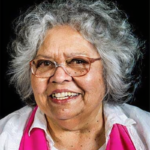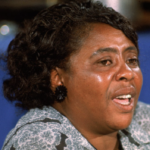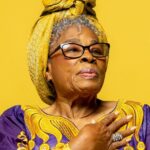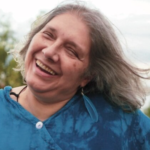
Lilla Watson, Aboriginal activist, academic, and artist:

“If you have come here to help me you are wasting your time, but if you have come because your liberation is bound up with mine, then let us work together.”
Fannie Lou Hamer, Civil Rights Icon:
![]()
 “Nobody’s free until everybody’s free.”
“Nobody’s free until everybody’s free.”
Opal Lee, Grandmother of Juneteenth, Civil Rights Icon:
 “I have to tell you that none of us are free until we are all free.”
“I have to tell you that none of us are free until we are all free.”
Aurora Levins Morales, Poet:
![]()
 “We cannot cross until we carry each other, all of us refugees, all of us prophets. No more taking turns on history’s wheel, trying to collect old debts no-one can pay. The sea will not open that way. … and all of us must be chosen. This time it’s all of us or none”
“We cannot cross until we carry each other, all of us refugees, all of us prophets. No more taking turns on history’s wheel, trying to collect old debts no-one can pay. The sea will not open that way. … and all of us must be chosen. This time it’s all of us or none”
Tenaja Jordan, Writer, Organizer and Research & Communications Director:
 “May we continue to work in true solidarity towards collective liberation, knowing that none of us are free until we are all free.”
“May we continue to work in true solidarity towards collective liberation, knowing that none of us are free until we are all free.”
Review a longer post about collective liberation by UUSJ’s Executive Director, Pablo DeJesús:
If “nobody’s free until everybody’s free,” shouldn’t we be…
Advocates for Collective Liberation?
A Summary:
Collective liberation is the idea that multiple oppressions are intertwined and that people must work together to end them. It involves:
- Acknowledging oppression
Acknowledging oppression is often associated with recognizing root causes, and it points to the recognition that systems of oppression are connected and that these systems create the conditions of people’s lives. Unitarian Universalists are very focused on root causes.
- Working together
Often associated with “being in solidarity” or “working in solidarity” to undo oppression in communities, families, institutions, and ourselves. The justice-making notion of being “eye-to-eye, shoulder-to-shoulder, arm-to-arm,” which has been embraced by Unitarian Universalists, points to this idea.
- Centering marginalized voices
Centering marginalized voices is often associated with recognizing root harms, which suggests prioritizing the experiences and voices of those who have been marginalized. The justice-making notion of widening the circle of concern, which Unitarian Universalists have embraced, supports this idea.
- Building community
Building relationships and sharing stories, both joyful and sorrowful, to build shared accountability and power. The famous LGBTQia refrain, “Nothing about us, without us,” sums up the sentiment well, as does the refrain, “El pueblo unido, jamás será vencido.”
- Learning
Acknowledging that everyone has a role to learn when it comes to issues of justice and equity. Looking to understand and accept the existence of root harms as we move to a state of being where we value and honor the lived experience of those not ourselves.
UU Resources:
- Introducing the Liberation Collective, Rev. Claudia Jiménez, Minister of Faith Formation, UU Congregation of Asheville, NC
- What is Collective Liberation? Rev. Sue Browning, Minister, UU Fellowship at Easton, MD
- Collective Liberation and Radical Healing, Rev. Dr. Kate Walker, First Unitarian Church of Pittsburgh, PA
- Forge a path to Collective Liberation, The First Unitarian Church of Honolulu, HI
- The Question of Collective Liberation, Rev. Jennifer Innis, Settled Minister, UU Church of Peoria, IL
- Conversations for Liberation, Congregational Resources, UU Association (UUA)
- Widening the Circle of Concern, Selected Report Excerpts with Summary Comments from
Presenters at August 5, 2020 8th Principle Inter-Domination Zoom Call with 106 participants, Co-Led by Paula Cole Jones & Bruce Pollack
Other Resources:
- The Combahee River Collective Statement, Black Past
- Jemez Principles for Democratic Organizing, Southwest Network for Environmental and Economic Justice (SNEEJ), Jemez, New Mexico, Dec. 1996
- Towards Collective Liberation: Anti-Racist Organizing, Feminist Praxis, and Movement Building Strategy, by Chris Crass (Author), Chris Dixon (Introduction), Roxanne Dunbar-Ortiz (Foreword); Summary: FROM A PLACE OF LOVE Catalyst Project and the Strategy of Collective Liberation Leadership in White Communities An Interview with Catalyst Project
- Catalyzing Liberation Toolkit: Anti-Racist Organizing to Build the 99% Movement, Catalyst Project, and Chris Crass
- Collective Liberation: Allyship Versus Solidarity, Tenaja Jordan, New Breath Foundation
- A Black August guide for collective liberation, Reckon News
- Core Values, Center for Racial Justice Education
- Educators Moving Towards Collective Liberation: Reflections on the #EIEJ2021, University of Colorado Boulder School of Education in association with A Queer Endeavor, University of Colorado Boulder School of Education
- What we mean by collective liberation, Enfleshed
- On “Collective Liberation”: It’s All of Us or None, Opinion, The Amherst Student
- Dr. King and Collective Liberation, TCJ Student
- I Must Go: MLK’s Radical Commitment to Collective Liberation, Dr. Sharon R. Fennema, Curator, Join the Movement toward Racial Justice, United Church of Christ
- Martin Luther King and a theology of liberation, Baptist News Global

